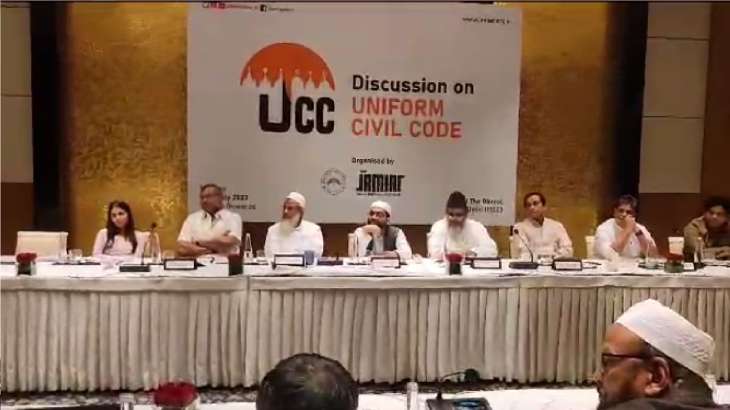
UCC Row: Jamiat Ulema-e-Hind on Monday held a meeting on Uniform Civil Code (UCC) with Muslim Members of Parliament (MPs) and other eminent persons at a hotel in Delhi. The Muslim body said the UCC would create discord among the communities and curb their constitutional rights to practice religion freely.
Imran Pratapgarhi, National Conference’s Hasnain Masoodi, Danish Ali, Mehboob Ali Kesar, ET Bashir, Mohammad Javed Abdus Samad Samdani attended the meeting. Congress MP Karthik Chidambaram was also present in the meeting. All MPs in chorus said they would oppose the UCC in Parliament.
JayAmiyat Ulema-e-Hind held a meeting in Thane
Earlier on July 10, Jamiat Ulema-e-Hind had organized a meeting in Thane district to protest against the Uniform Civil Code.
At a meeting held at a mosque in Mumbra, a ‘quick response’ (QR) code was devised to allow people to express their opposition to the UCC.
Among those who addressed the meeting was Jamiat Ulema-e-Hind general secretary Halimullah Qasmi, who said the community members would go by the Muslim Personal Law Board’s decision on the matter.
Law panel extended the deadline
The Law Commission on July 14 extended the deadline for the public to send their views on the Uniform Civil Code (UCC) till July 28, saying the decision was taken following overwhelming feedback and several requests seeking more time to submit suggestions.
On June 14, the law panel had sought feedback from organizations and the public on the UCC. The one-month deadline to file the reply ended on Friday, after which it was extended.
The Law Commission said it values inputs from all stakeholders and aims to create an “inclusive environment that encourages active participation”.
“We encourage all interested parties to use this extended deadline to contribute their valuable ideas and expertise,” it said in a public notice.
The Commission said that in view of the “overwhelming response” from the public on the subject and several requests received from various sectors seeking extension of time for submission of comments, it was decided to grant an extension of “two weeks” for submission of views and suggestions by the concerned stakeholders.
It said that any interested person, institution or organization can give comments on the UCC on the Commission’s website till July 28. So far, its website is learned to have received over 50 lakh responses, in addition to written submissions sent by post. On 14 June, the Law Commission launched a new consultation process on the UCC by seeking views from stakeholders including the public and recognized religious organizations on the politically sensitive issue.
Earlier, the 21st Law Commission, whose term ended in August 2018, had examined the issue and sought views of all stakeholders on two occasions.
Subsequently, a consultation paper on “Family Law Reform” was released in August 2018.
In a public notice, the panel had said, “Since more than three years have elapsed from the date of issue of the said consultation paper, keeping in view the relevance and importance of the subject and the various court orders on the subject, the 22nd Law Commission of India deems it appropriate to deliberate on the subject afresh.”
Appearing before a parliamentary committee earlier this month, representatives of the law panel had defended the new consultation exercise, noting that the erstwhile commission had given its recommendations in 2018 and its term had also ended. That is why, a new initiative has been launched which is essentially “informational”, he had said.
In its consultation paper released on August 31, 2018, the previous Law Commission, headed by Justice BS Chauhan (retd), said the diversity of Indian culture can and should be celebrated, but specific groups or weaker sections of society should not be “disadvantaged” in the process.
It added that instead of providing a Uniform Civil Code, the commission has dealt with laws that are discriminatory “which is neither necessary nor desirable at this stage”. The consultation paper states that most countries are now moving towards recognizing differences and the mere existence of differences is not discrimination but a sign of a strong democracy.
In short, UCC is meant to be a uniform law for all the citizens of the country which is not based on religion. Personal law and laws relating to inheritance, adoption and succession are likely to be covered by a common code.
Implementing common code has been a part of BJP’s election manifesto.
Uttarakhand is all set to have its own UCC in the coming days.